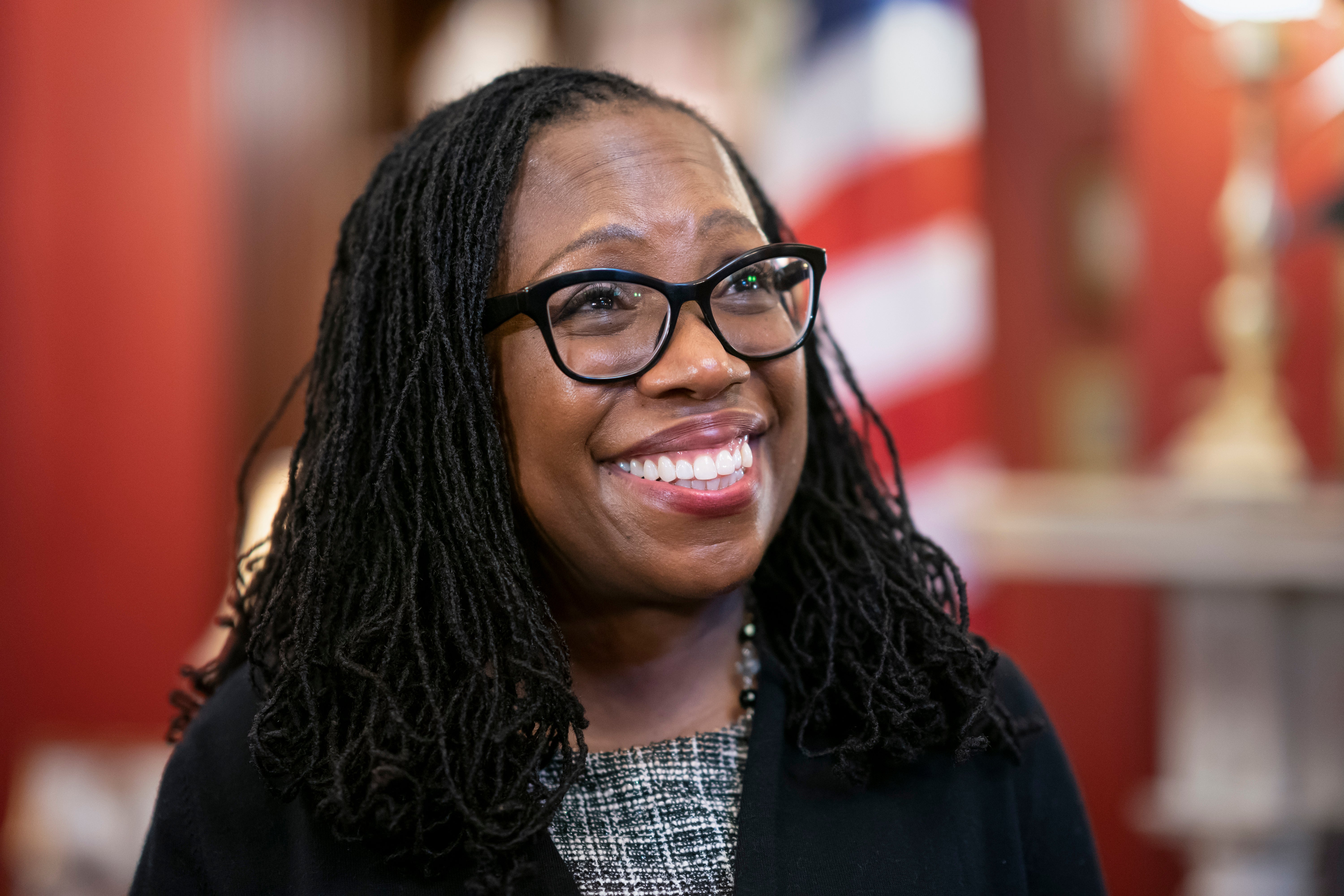The Independent's journalism is supported by our readers. When you purchase through links on our site, we may earn commission.
Ketanji Brown Jackson should never have downplayed her work with Guantanamo Bay inmates
The justice was targeted during her Supreme Court hearings for supposedly helping ‘terrorists’. As someone who has done the same kind of work — and proudly — I find it sad that she felt she had to minimize what she did


Your support helps us to tell the story
From reproductive rights to climate change to Big Tech, The Independent is on the ground when the story is developing. Whether it's investigating the financials of Elon Musk's pro-Trump PAC or producing our latest documentary, 'The A Word', which shines a light on the American women fighting for reproductive rights, we know how important it is to parse out the facts from the messaging.
At such a critical moment in US history, we need reporters on the ground. Your donation allows us to keep sending journalists to speak to both sides of the story.
The Independent is trusted by Americans across the entire political spectrum. And unlike many other quality news outlets, we choose not to lock Americans out of our reporting and analysis with paywalls. We believe quality journalism should be available to everyone, paid for by those who can afford it.
Your support makes all the difference.There was never any reasonable doubt that Judge Ketanji Brown Jackson would be confirmed for the Supreme Court. The Republican questioning at the hearing was a racist, misogynist Passion Play, a squalid sacrifice at the MAGA altar. They well knew that their propagation of QAnon pedophile conspiracies and racist babies would get no traction in the Senate or with the American people. But associating her with the representation of terrorists was more likely to strike a broader political chord.
Throughout the hearing, Judge Jackson was asked pointed questions about her work as a federal public defender representing detainees at Guantanamo Bay. Lindsey Graham addressed whether the government has the right to hold detainees indefinitely without charges. He said, “I hope they all die in jail if they’re going to go back and kill Americans.” Marsha Blackburn attacked Jackson for using her “time and talent not to serve our nation’s veterans or other vulnerable groups, but to provide free legal services to help terrorists get out of Gitmo and go back to the fight.” The risk from these men is de minimis at best.
Judge Jackson’s replies to this line of questioning were politically shrewd but disappointingly evasive in contrast to the rest of her testimony, which was generally consistent with the highest ideals and standards of the American legal profession. She noted that she neither volunteered for Guantanamo work nor sought it out. She was assigned these cases. She also referenced that she was an appellate advocate doing research and writing on points of law; she never visited Guantanamo or met a detainee. What she failed to mention was that none of her clients was ever tried, much less convicted; all the charges were dropped and all were released by the Department of Defense.
Judge Jackson may have offered an entirely truthful account of her work, but it misses a larger point — namely, that her work on behalf of Guantanamo detainees should not be minimized or explained away. In fact, her efforts represent the very best traditions of the bar and some of the most important work that attorneys can do. I, as well as many others, have done this work for nearly 20 years; these have been the proudest moments of my career and those of many others, not because we support terrorism, but we support the rule of law.
Lawyers’ work cannot be limited only to those who garner our sympathies but must include those who are vilified. This is how our profession seeks justice and has since its earliest days. Those who look for originalist wisdom might note that prior to the Revolution, John Adams took on the work of defending British soldiers who fired on protesters in what became known as the Boston Massacre. Thurgood Marshall was threatened by lynch mobs. No doubt, lawyers for Dred Scott or Homer Plessy or Fred Korematsu were similarly unpopular.
The Republicans on the Senate Judiciary Committee, who sanctimoniously invoke the Constitution, surely know that the Sixth Amendment requires assistance of counsel and the integrity of the system requires the most skillful and committed efforts to those who are most in jeopardy. Representing Guantanamo detainees is a profoundly conservative task — to make sure that every defendant has his day in court and that no one in our system is presumed guilty and detained without trial.
The most obvious reason for such a bedrock principle is that the government doesn’t always get it right and it may be that a defendant is not guilty. I was asked by a distinguished judge, based on our firm’s experience in this area, to assist in a capital case involving accusations against a Libyan charged with killing four Americans, including our ambassador. The judge wanted to make clear to this defendant and the world that accused terrorists would be given a full and fair trial by experienced lawyers. A District of Columbia jury acquitted our client of all four homicide counts because the evidence did not support those charges. Emotion and panic are no substitute for admissible facts.
Guantanamo defendants have been pilloried in the press for two decades now as terrorists, along with their lawyers as somehow supporting terrorists. In 2007, Cully Stimson, a senior Department of Defense official, urged all US companies to refrain from hiring lawyers who represented detainees. He said that corporate CEOs “should ask firms to choose between lucrative retainers and representing terrorists.” Stimson later called his own comments “boneheaded” and resigned his position.
As Linda Greenhouse reported, now-Justice Gorsuch — when part of the Bush Justice Department while at DOJ — forwarded a blog post to a friend from the right-wing American Spectator deploring the growing involvement of prominent law firms in providing representation to Guantánamo detainees. His message read: “It seems odd to me that more hasn’t been made of this.” His friend replied: “The great fallacy here, of course, is that this work helps to protect the rights of Americans. By definition, the only rights at issue here are those of suspected alien terrorist enemies during time of war.” Gorsuch’s reply? “Exactly.”
During the confirmation hearing, Senator Dick Durbin, who now heads the Judiciary committee, asked him about it,“The email you’re referring to is not my finest moment, blowing off steam with a friend, privately,” he replied. “The truth is, I think my career is better than that.”
Tactical remorse by Gorsuch does not obviate the fact most Guantanamo defendants were never given their day in court. More than two dozen remain after 20 years or more, never having been charged with anything. They are the forever prisoners, subject to indefinite detention without trial, possibly for life, a first in American history. These were the legal issues that Judge Jackson was working on so many years ago.
During the time Judge Jackson served as a public defender, the vast majority of detainees at Guantanamo were either entirely innocent, or were low-level foot soldiers who came to Afghanistan before September 11. The so-called high value detainees were brought to Guantanamo in 2006, specifically because the Bush administration knew that it was not incarcerating the “worst of the worst,” despite the fact that Secretary Rumsfeld and others falsely reiterated this time and time again to the American people.
If someone is suspected to be a terrorist, that is a serious charge which must be proved or disproved by evidence, as with any other charge in our system. We have effectively tried many terrorists over many years in US courts. The problem with Guantanamo is that there was a serious question as to whether any of these men were terrorists and, if so, which ones. The US government just assumed the desired conclusion; even when it came to know that most of them were not terrorists, it continued to hold many of them because it was politically unacceptable to admit its grievous mistakes and deprivations of liberty in the name of the “war on terror.”
We need more Judge Jacksons who see through the fog of political posturing to the clarity of justice, on behalf of Guantanamo detainees and others. She should embrace rather than downplay her service. Any system of justice worthy of that name requires committed lawyers who are willing to take on controversial cases and let judges and juries decide based on evidence, not politics.
Eric Lewis is a human rights lawyer who sits on the board of The Independent